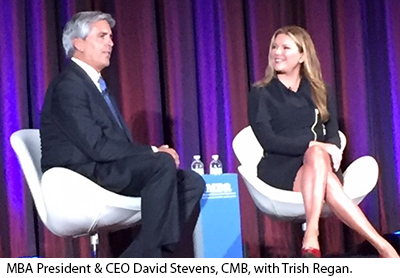
Stevens: Housing Finance Markets Need More Clarity
NEW YORK–Mortgage Bankers Association President and CEO David H. Stevens, CMB, said the real estate finance industry wants clarity–in regulation, in legislation and in policy.
“There’s still a lot of unknown risk,” Stevens said here at the MBA National Secondary Market Conference & Expo. “We’ve been asking for more clarity from our regulators and we need to make it easier for consumers. The challenge we have is that people will assume that we are against regulation. We want good rules that can be easily understood that protect consumers and can be implemented nationally.”
 Stevens’ appearance, interviewed by Trish Regan of The Intelligence Report with Fox Business Network, was his last as MBA President and CEO at a major MBA conference; Stevens announced his retirement last October and plans to leave office no later than Sept. 30. MBA is engaged in a high-level search process for a new president and CEO, with an announcement expected by the end of June.
Stevens’ appearance, interviewed by Trish Regan of The Intelligence Report with Fox Business Network, was his last as MBA President and CEO at a major MBA conference; Stevens announced his retirement last October and plans to leave office no later than Sept. 30. MBA is engaged in a high-level search process for a new president and CEO, with an announcement expected by the end of June.
Stevens said the lack of clarity has led to misleading headlines and the continued perception that mortgage bankers engage in “redlining” and other discriminatory practices, particularly against minorities. “We should all be working toward creating opportunities instead of dividing,” he said.
Regan noted the past few years have seen a lot of disruption–not the least, the election of Donald Trump as president. “A lot of people underestimated his ability to disrupt the political system,” she said. “There was a sentiment in America that was very much on [Trump’s] side.”
Regan said the new political and regulatory landscape requires balanced thinking. “One of the most important things to remember in this environment is that you don’t want to be red; you don’t want to be blue; you want to be green,” she said. “You want your children to have the same opportunities you have, and you need to look at the things that could change those markets.”
The current administration, Stevens noted, has some “real experts” on housing policy, such as Pam Patenaude at HUD and Michael Bright at Ginnie Mae. “The real problem is that there is not enough housing inventory,” he said. “One of the big challenges in providing homeownership opportunities is simply having more inventory on the market–and that has its own regulatory issues. We have to give home builders the incentives to build more entry level homes.”
Stevens added this is a “far bigger” issue for home builders to solve alone. “All of us have to work together–mortgage bankers, realtors, home builders–to create meaningful change,” he said. “We don’t have to worry about people wanting to own a home–they do.”
This is important, Stevens said, because Americans are feeling better about their economic conditions. “We forecast mortgage rates to continue rise, but we also forecast housing to rise,” he said. “Unless we hit another major recession, we’re going to remain bullish on the housing market and the economy. The fundamentals are pretty good.”
Looking ahead, Stevens said, political turmoil will change the variables. “Housing is non-partisan issue,” he said. “But should the Democrats flip the House, you’re going to see a bigger focus on affordable housing. Regardless, we need more clarity on issues. If you want more affordable housing, then you need to fix provisions of the False Claims Act that punish lenders for even minor infractions, the result of which has been dozens of lenders exiting FHA lending.”
Lenders want to do business the right way, Stevens added. “Back in 2008, collectively the industry passed the fault line,” he said. “I joined the [Obama] Administration with the attitude that we had to pass regulation because the industry couldn’t self-regulate. Today, we live in an era where credit is so tight that we can’t extend credit to some people who need it. There has to be a balance. The next President could be a Democrat and we could see the deregulation pendulum swing back. We need stability; we need responsible lending; and I worry that we don’t self-police ourselves enough.”
Looking back at his MBA years, Stevens said what he is proudest of is that the industry came together in defending a level playing field. “We’ve fought for policy that has benefited all out members,” he said.
